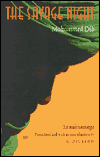The Savage Night
by Mohammed Dib, translated by C. Dickson. University of Nebraska Press, 2001. 191 pages.

Readers whose mental image of Algeria has been formed by Camus's The Plague or Paul Bowles' The Sheltering Sky will find that The Savage Night paints a picture that is equally bleak. But this collection of masterfully told stories addresses questions of violence that are relevant not only for Algeria itself, torn apart for the last decade by terrorist attacks and government crackdowns, but for the US in the wake of September 11.
Mohammed Dib was born in Algeria in 1920 and was deported for his nationalist views in 1959, during the country's long and bloody war for independence. Though he is a prolific and honored writer in France, where he now lives, his work has been almost unavailable in English. The University of Nebraska Press, which published this collection of thirteen stories, says it is "the first book-length English translation of Dib's work." (A novel entitled Who Remembers the Sea, however, was published by Three Continents Press in 1985 and is now out of print.)
The subject of nearly every story in this collection, as the author points out in a helpful afterword, is the violence and injustice of the 20th century, particularly violence that is carried out coldly because it is motivated by ideology rather than personal emotion. In many of these stories, relatively straightforward action is coupled with psychological subtlety.
The title story, "The Savage Night," presents a young man named Nédim and his sister Beyhana as they travel by trolley through the midday heat of Algiers. Nédim and Beyhana are physically and emotionally spontaneous, similar in looks, and with a mutual understanding so deep that they seem more like lovers than brother and sister. Their shifting thoughts and emotions are described with great sensitivity and sympathy, even as Nédim begins thinking that the other passengers on the trolley are "dummies" that will soon "be offered up to the flames, reduced to smoke." These two young people, we gradually realize, are on their way to commit an act of terrorism for which we never learn the exact reason. In a remarkable exercise in authorial control, the narrator retains his intimate and sympathetic tone toward his protagonists through the commission of their bloody deed and its messy aftermath, telling the story from their point of view as one of regret and self-sacrifice, rather than one of an outrageous crime.
In "A Game of Dice," Mohammed Dib sets up the rare situation in which a terrorist is forced to answer to his would-be victim. Two young men burst into a courtyard, intending to assassinate an old man from whom they expect no trouble. The old man, however, is ready for them, and once he has killed one of the attackers and trapped the other, he conducts a lengthy interrogation of the surviving youth that is intended partly to torture him but also to get to the bottom of what motivates him. Who has ordered him to do this? Does he believe it is the will of God? Now that the tables are turned, does he believe it would be fair for him to die? Does he really understand the meaning of death? The old man proposes that the young man play dice with him for his life, and as the game favors one player and then the other the conversation becomes more impassioned. "I'm nothing but pain as far down as you can reach," says the would-be terrorist. "I'm nothing but an open, festering wound." The old man hazards his own interpretation: "Essentially, you -- all of you, you and your kind -- are nothing but our own personal demons.... And because we weren't skillful or clever enough to keep you chained up where you should have been, here you are, free to move about, free to infest the earth and, like howling wolves, forever call up the past."
"A Game of Dice" tantalizes us by hinting at answers to what motivates the seemingly mindless atrocities that ravage our societies. But as Dib points out in his afterword, "it is not a writer's job to mete out lessons but to reverse the learning process. He does not prescribe responses but rather poses questions." Not all the stories in The Savage Night take place in Algeria -- others are set in Paris and Sarajevo, and the heartbreaking "Paquita, or The Ravished Gaze" takes place somewhere in Latin America -- but the troubling questions this book asks are inescapable no matter the location.
From The Savage Night:
They had shown them the door. Two boys -- one eighteen, the other, maybe twenty. Eighteen and twenty years old, no more. They had said to them, "There it is." They had said to them, "It's never locked." It was closed. They pushed it. It opened. They went in. Or rather they burst into the courtyard, a large patio. It would be light for quite some time yet -- the curfew would sound, and it would still be light. Here it was lighter than day -- one couldn't tell why -- lighter than it was out in the city. And that silence. It was impossible to explain what it was like. The patio was shimmering with muteness and solitude. They had said to them, "He lives alone."
They had said to them, "With this man, there'll be no problem. You just go there. He lives alone. An old man. And everything will go smoothly."
They had said to them, "It'll be a piece of cake."
Published in The African, March 2002.


